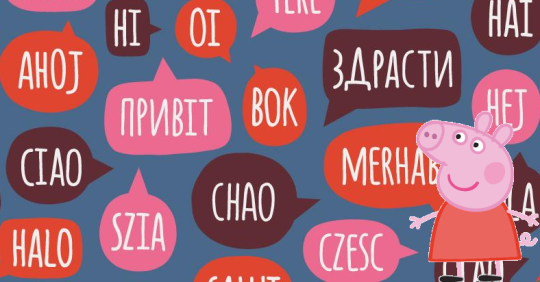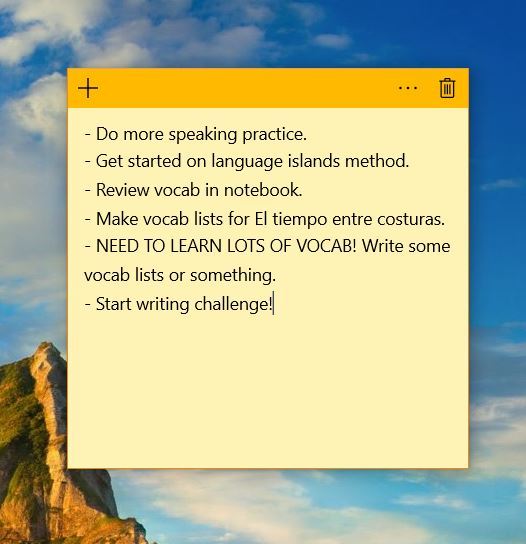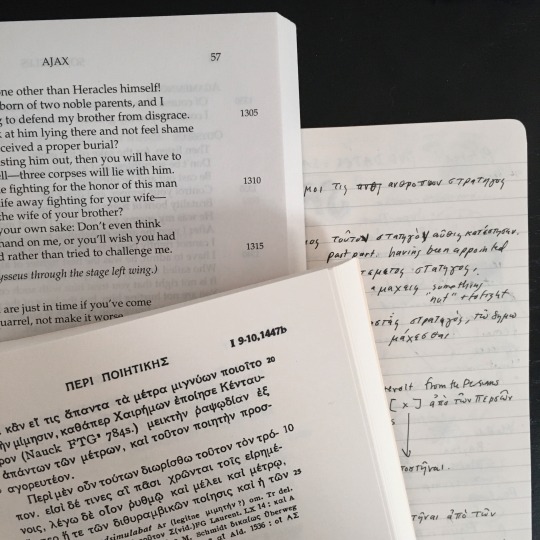Text
So I found this cool website for learning ancient languages
go wild
306K notes
·
View notes
Text
The reality of language learning
I’ve been thinking about writing this post for a while, considering how much I struggled with Russian and Czech (and inevitably failed) and how much I still struggle with German.
A lot of beginners get sold into this naively optimistic view promulgated by so many ‘internetesque’ polyglots: that language learning is easy and quick to do. Of course it’s appealing to think that even you could be fluent in three months; just like Benny Lewis! However, you will come to realise [hopefully] that these are mere marketing tricks to try and get you to purchase their products, peruse their websites, or boost their ego.
As you start progressing through the beginner’s stage you reach a point of enlightenment in which you realise that language learning is not just ‘okay so I learn a couple of thousand words, maybe like 30 a day, go through a quick grammar book and ta-da I’ve achieved linguipotence! Should take like a few months right?’. It’s so much more than that, and probably one of the most complex interests/skills you can ever develop.
And as time goes on, even more of your preconceptions start to fade away. You think you’re going to understand everything in your target language? That’s an ocean which you’ll never traverse… do you know the English word ‘melopoeia’ for example - probably not (it means “the art of composing melodies”). Even in your native language you possess gaps in your lexicon, and these gaps will be even greater in your target language.
You think you’ll be able to learn 30 words a day, every day, without it ever becoming a burden? I admire you if you can do that, but at the beginning this is a great deal to ask from someone, as trying to learn 210 words in a week in a language you have never studied before is an astronomical task for your brain. More importantly, there will be words you’ve encountered in your target language before which you’ll forget if you don’t use them after a while.
And with regards to grammar, you will never realise what a monumental task merely trying to use a verb is (which person, which voice, which mood, which conjugation, does this need a prefix?, is this verb synonymous) until you attempt to do so. Grammar is no easy feat in language learning either.
So some down-to-earth tips for the beginner:
- It is not a race. Do not expect to learn the whole language in a few months, and lose the notion of learning ‘everything’.
- Do not listen to the internet polyglots who have some form of ulterior motive; many of them out there have genuine, good, linguistic skills, but they are often overshadowed by the beguiles from false prophets.
- Do not get ahead of yourself. Do not think that you can learn the entirety of one new grammar topic each day, or 30 words in a day, or perfect pronunciation in a day. Take it one step at a time.
- Push through the wall. Such a common occurrence in the uptaking of new hobbies is the part where it sucks because you’re awful and struggle to do basic things in said new hobby. You have to push through this; you can only get better by continuously trying, and you’ll only get worse by not trying (trust me, as someone who has tried and given up on three languages).
I see so, so many new people in the langblr community who have recently gained an interest in learning languages and state they’re learning “French, Manx, Gothic, Portugese, Ancient Greek, Greenlandic, Finnish, and Swiss German”. And time after time I just want to scream at them ‘slow the fuck down’. It’s so easy to get caught up in the delirium of adding as many languages to your repertoire as possible, but if you actually sit there and think how hard it is to learn one extra language, it should bring you down to Earth.
Posessing extra languages are clearly important desiderata for many people, and I feel it’s important to start one’s language learning journey with some clear perspective on how it will actually be. Nothing is ever full of roses, and it will be hard, but it will be worth it. Rome wasn’t built in a day.
2K notes
·
View notes
Text
Speaking and Writing Prompts
Here’s a list of some conversation and writing prompts that I found. You can use these as conversation starters with a language partner or as speaking/writing prompts by yourself. Some of them might be okay for beginners, and others are pretty advanced.
20 Engaging Conversation Ideas to Practice Your Spanish
24 Excellent ESL Conversation Questions for Adults
36 Unique Language Exchange Conversation Starters
50+ Language Exchange Topics to Keep the Conversation Flowing for Days
119 Journal Prompts for Your Journal Jar
401 Prompts for Argumentative Writing
501 Writing Prompts
Conversation Questions for the ESL/EFL Classroom
ESL Conversation Questions
Grade 5 Writing Prompts
Journaling Junkie Prompts and these, also from Journaling Junkie
So What Do You Want to Talk About?
Ten Great Conversation Starters for Language Learners
Writing Prompts/Journal Topics
201 notes
·
View notes
Link
There are different language learning types. Even if you don’t know what type of learner you are, you should still try out some of these methods and see which ones work best for you.Check it out now: http://bit.ly/2Miy0En
85 notes
·
View notes
Text
Spanish Goals: July–December
I’ve finished my 200 Days of Spanish challenge, but I definitely haven’t finished studying Spanish! I plan to continue studying it intensively until July 2019, which is when I’ll start Chinese again.
Here are my goals for the next six months:
Improve my listening comprehension by doing lots of listening practice. I want to use a mix of resources: podcasts, TV shows, YouTube videos, etc.
Get better at speaking. I’m not going to put too much pressure on myself to speak, but I would like to do an iTalki lesson once or twice per month and go to Spanish meetups near where I live. I think the important thing is to learn more conversational expressions and practice speaking about difficult topics, not just about my life and my language studies, because those are easy to talk about at this point.
Get better at conjugating verbs quickly, and review grammar in general.
Learn lots and lots of words! I think a lack of vocabulary is my biggest problem right now. There are a lot of topics that I can’t talk about simply because I don’t know enough words. So I need to learn a lot more, which I’m going to do mostly through reading and writing:
Read more. In addition to reading books like El tiempo entre costuras and La sombra del viento, I want to start reading essays and news articles on a variety of topics. Reading is important because 1) you learn new words from reading, and 2) you then see those words again and again as you read more, and this reinforces what you learned.
Write more. This will also help me learn expressions and vocabulary, since I’ll have to look up whatever I don’t know. I’d like to get most of my writing corrected on iTalki so I don’t just repeat my mistakes over and over.
You might’ve noticed that none of these goals is quantitative. In the case of long-term goals like these, I think it’s too difficult to decide exactly how much studying to do. Instead, I’m going to make measurable goals at the beginning of every month, and after that month I’ll decide if I need to increase them.
1 note
·
View note
Text
Spanish Learning Through YouTube
Here are 4 amazing YouTube channels that’ll improve your Spanish MONUMENTALLY (if you actually put in the work and use them lol, I’m so guilty of sleeping on good resources. Learn from my mistakes and use these up!!!) :D
youtube
Butterfly Spanish
She’s so nice and her passion shines through. She teaches you a ton of stuff from beginner and beyond. And it’s like practical so you can actually go out and use what you learned immediately.
Channel Description: Learn Spanish for free with Spanish lessons that cover grammar, pronunciation, vocabulary, tips & tricks, and cultural aspects for all Spanish levels. I want to make you confident speaking Spanish, and to encourage you and provide you with all you need to make your dream of speaking Spanish come true.
youtube
Learn Spanish with Ouino
This is a program that costs money; however, they have a ton of free videos on YouTube that are AMAZING. Their vocab videos are okay, but their conversation builders are spot on! If you follow along and take the time to lightly memorize the dialogue, you’ll be having natural and fluent conversations in no time. I haven’t tried the paid version, but I do recommend the youtube channel.
youtube
Learn Spanish with SpanishPod101.com
An amazing, free, online resource with listening, reading, and vocabulary videos to help you become fluent. I personally love their listening practice videos like the one above. If this one is too easy for you, they have plenty of more advanced ones. If it was too hard, they also have lower levels and plenty of explanations :D
youtube
Easy Spanish
Channel Description: We are a non-profit project aiming to help people learn languages through authentic street interviews. Our videos show local language and culture in natural, everyday situations – something you can’t find in regular media. Each episode has a specific topic and is produced in one of our many partner countries around the world.
740 notes
·
View notes
Photo

A Zaydi manuscript from Yemen.
Al-Budeiry Library in the Old City of Jerusalem
197 notes
·
View notes
Photo
This looks so cool!

I decided to write down all the 常用漢字. Why am I doing this? Well, it’s an attempt to make my progress more tangible, I wanted to list all the kanji so that I could cross off (or should I say color out?) the ones I learned. Why not print out a list? I wanted to practice writing them and maybe I have slight masochistic tendencies XD
Please excuse my horrible kanji writing, I’m on my own and I’m trying my best (also I’m not used to fine point pens so the shakiness of my handwriting is super visible). I definitely messed a lot of these up but hey, that’s why I need to practice.
#also I have those pens too#this makes me want to study chinese again#i might start classes in july!#because my university offers free classes once a week#motivation
519 notes
·
View notes
Text
200 Days of Spanish: Complete!
It’s June 21, which means that my 200 Days of Spanish challenge is officially over!
Wow. These past few months I studied Spanish more intensively than I ever had before. I overcame my fear of speaking, had over ten language exchanges via Skype, and even went to Spain for two weeks and tried to speak Spanish as much as possible.
I still have a lot more studying to do though. I’ll be working full-time from July to the end of December, and I’m going to try to study Spanish for at least an hour a day on weekdays and two or three hours on weekends.
0 notes
Text
I made a language insta account! It’s amandalearnslangs if anyone is interested. I’m excited because I think I’m gonna use the instagram story feature to give more frequent updates on my language goals and progress. :)
11 notes
·
View notes
Note
Best advice for creating a schedule and being constant with your studies?
I can answer this in 2 ways.1. Assuming a schedule will work for you and give you advice on how to make a schedule2. Assume you are like me and will get frustrated if you can’t stick to a schedule.OPTION 1Prioritize which subjects (or languages depending on what you’re referring to) are most important to you. For the sake of this post and my blog, I’m going to keep referring to languages.Let’s say you want to improve Korean, Italian, Spanish and Finnish. You want to study in Finland and that’s your priority. You just want to keep Spanish up conversationally, and you want to learn to become conversational in Italian and reach an advanced level in Korean, for instance.That would mean: Most of your time should be spent learning Finnish, then Korean, then Italian and then Spanish, right?Now that you’ve prioritized which are most important, decide how much free time you have in your day. If you’re like me and work until 4:30PM, you’ll get home at 5 and can study from 5 to 7, for example. That would be 2 hours of full study time. Decide if you want to focus on all the languages in a day, or one language in a day. All languages: divide up your time. You want to spend 60% of the time on Finnish, 25% of the time on Korean, and the rest on Italian and Spanish. You can make up these figures and switch it around. Start with review, then move onto learning new concepts. Make a schedule on paper. Write the days of the week you have open, and the time slots you have available. I tried to make a schedule and I wrote Monday to Sunday and under it Morning, Afternoon and Evening. You can do it by hours if it works for you. Then space out the languages or the tasks. If you want to do one language a day, decide which one goes where. If you want to do all the languages in a day, decide what you’ll focus on, like reading, writing, listening, speaking, vocab, writing, and so forth. OPTION 2This is my method. No schedule. I haphazardly study whatever I feel like. This depends on your personal goals. For me, language learning is something that I enjoy and that I use to relax. Making a schedule and not being able to stick to it is very frustrating and upsetting to me. I don’t want extra stress and admin in my life. My personality is also pretty up and down and I tend to go through phases of obsession - currently I’m obsessed with Hungarian, Mandarin and Hindi, but a few months or years ago it was Korean, Japanese and Vietnamese. Even further back, French, Estonian and Arabic. See, my interests change so frequently and I know I can’t trust myself to commit to “learning 15 new Korean words” each day and “studying a chapter of Japanese” once a week and “skype calling my Hungarian friend” every second week. But what I can commit to is to do something in each language every day. Every single spare minute I have, I will do what I feel like in any language. I’ll listen to Hungarian radio when I wake up in the morning. My car CD is a Hindi album. I speak Afrikaans at home. I email my penpal at work in French. I make a video in Korean after work. I study Hungarian verbs after work. I read the Bible in French before bed. Etc. This tends to work for me because it keeps things unpredictable and interesting and I won’t feel bad for not “achieving” my goals in terms of not having stuck to a schedule.
147 notes
·
View notes
Text
Doing Lesson 2 in my Ancient Greek textbook! This lesson has a list of words to practice pronouncing.
1 note
·
View note
Text
Resources for Old English
Books/Coursebooks
A Guide to Old English (Bruce Mitchell, Wiley-Blackwell) - Very grammar based, also contains texts, used on many courses teaching Old English.
Introduction to Old English (Peter S. Baker) - Also used on many courses, contains sections on grammar and texts.
Sweet’s Anglo-Saxon Primer (Henry Sweet) - This is a grammar based book, written originally in the late 19th century, with texts as well as a glossary (Online version: 1, 2).
Complete Old English (Teach Yourself) - Basic introduction to OE with exercises that teach grammar and vocabulary. A CD is also available.
A User-Friendly Dictionary of Old English (Bill Griffiths) - A basic dictionary which also contains grammar and literature sections (with translations).
First Steps in Old English (Stephen Pollington) - A coursebook based on learning grammar and vocabulary through exercises, it also contains texts. A CD is available.
Æðelgyðe Ellendæda on Wundorlande (Peter S. Baker) - Alice in Wonderland in Old English!
Be þam lytlan æþelinge (Fritz Kemmler) - The Little Prince (Le Petit Prince) in Old English!
Websites
Old English Wordhord - Twitter/Website
University of Calgary - Basic texts, lessons and a grammar section.
Old English Core Vocabulary - University of St. Andrews
Anglo-Saxon Aloud - Recordings in Old English by Michael D. C. Drout.
Omniglot Basic Old English Phrases
Old English Translator
Old English Aids (Royal Holloway)
The Complete Corpus of Old English Poetry
Old English Aerobics (Grammar)
King Alfred’s Grammar Book
Englisc Onstigende Wordbōc
Online Dictionaries
A Concise Old English Dictionary (John R. Clark Hall)
Bosworth-Toller Anglo-Saxon Dictionary
Dictionary of Old English (University of Toronto)
Youtube
Leornende Eald Englisc - Channel
Other
Old English ‘Magic Sheet’ (S. Moore and A. Marckwardt)
309 notes
·
View notes
Text
Peppa Pig in Different Languages

I’m pretty sure everyone knows who or what Peppa Pig is. If you do, you probably have watched it one time or another when you were little. I used to like it because of the simple vocabulary it has and it gave me great joy when I understood a whole episode in English.
If you’re a language learner you know how difficult it is to listen to shows or movies in your target language because they’re so fast. Peppa Pig is obviously a children’s show, but it has been translated into a lot of different languages that may help out any beginner in a language or anyone who wants to give a watch and see if they understand it! Peppa Pig - being a children’s show - uses slow speech and simple vocabulary that small children can understand, here’s a list of Peppa Pig in different languages you can watch on YouTube:
Albanian - Derkucja Pepa
Arabic - Peppa Pig
Belarusian - Свінка Пэпа
Cantonese - Peppa zhū (粉红猪小妹)
Catalan - Pepa la Porqueta
Croatian - Pepa Prase
Czech - Prasátko Peppa
Danish - Gurli Gris
Dutch - Peppa Big
Finnish - Pipsa Possu
French - Peppa Pig
German - Peppa Wutz
Greek - Πέππα το Γουρουνάκι
Hungarian - Peppa Malac
Italian - Peppa Pig
Korean - Peppa Pig
Latvian - Cūciņa Pepa
Lithuanian - Kiaulyte Pepa
Macedonian - Прасенцето Пепа
Mandarin - 粉红猪小妹
Norwegian - Peppa Gris
Polish - Świnka Peppa
Portuguese - A Porquinha Peppa
(Brazilian) Portuguese - Peppa Pig
Romanian - Purcelusa Peppa
Russian - Свинка Пеппа
Scottish Gaelic - Peppa
Serbian - Pepa Prase
Spanish - Peppa Pig
Spanish (Latin America) - Peppa Pig
Swedish - Greta Gris
Ukrainian - Свинка Пеппа
These are the ones that can be found on YouTube. Unfortunately, there are some languages missing but if anyone knows where one can watch them please feel free to add!
5K notes
·
View notes
Photo

I haven’t been making a detailed study schedule lately. Instead, I use the little sticky note feature on my laptop to write notes for myself about what I should do during the next study session. Then I just pick one or two things to work on. As you can see, right now I’m really focused on increasing my vocabulary in Spanish. :)
2 notes
·
View notes
Text
Ugh I tried to do some Spanish speaking practice but I was too tired! I’m going to speak more tomorrow.
Goal: Do speaking practice every day this week! It’s good to be consistent. :)
1 note
·
View note

